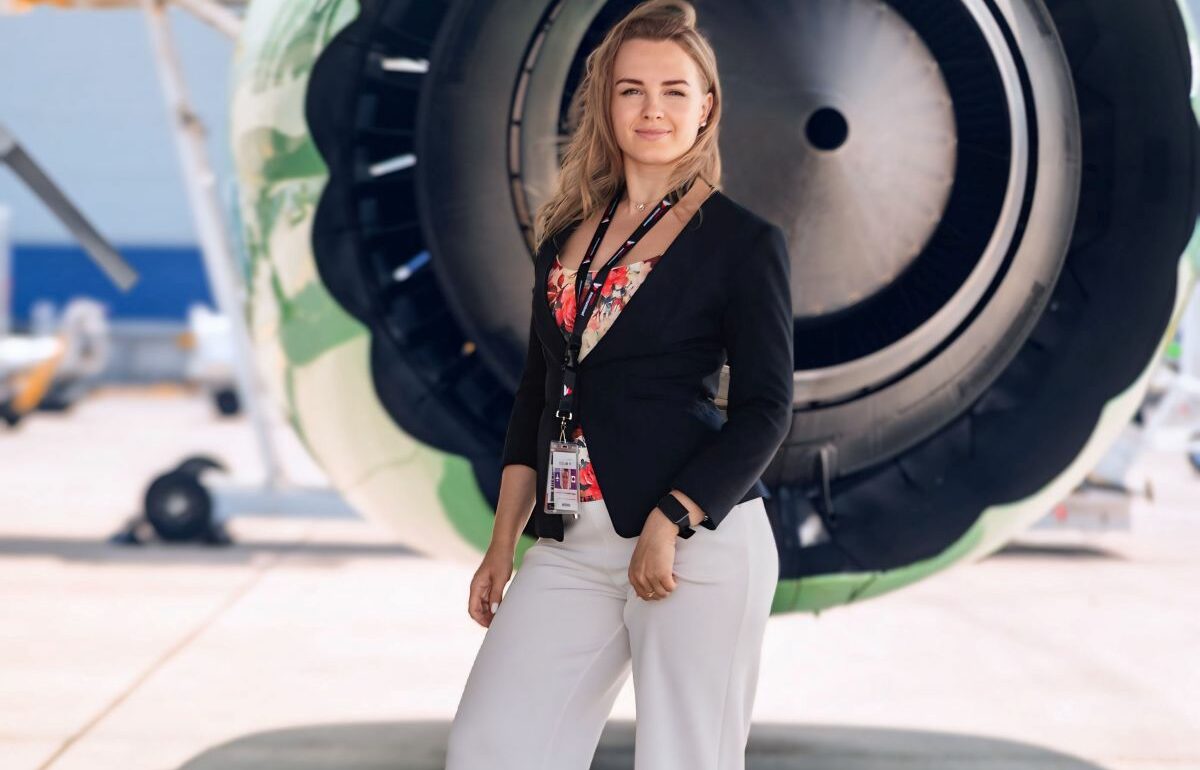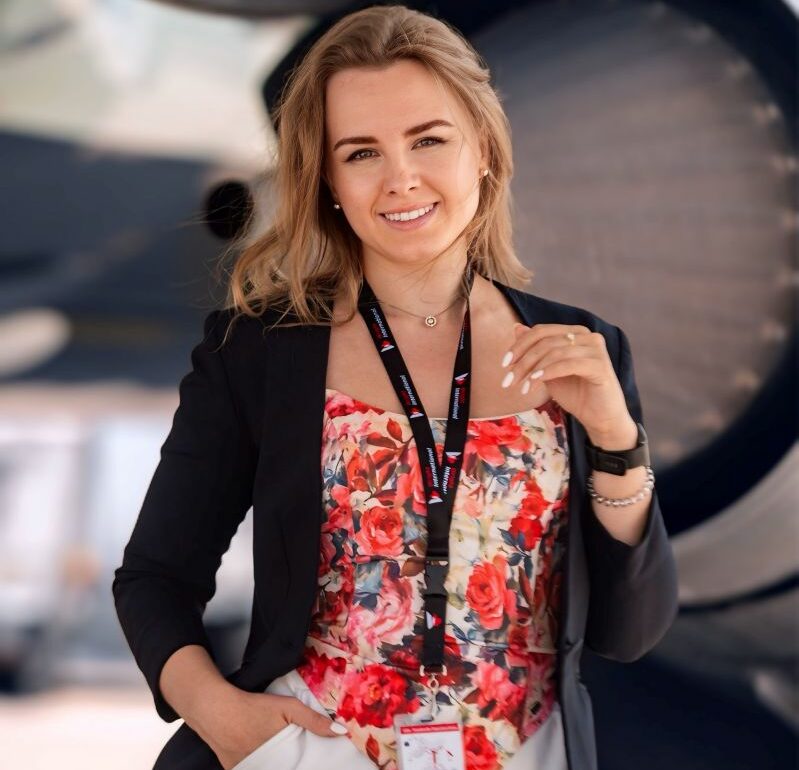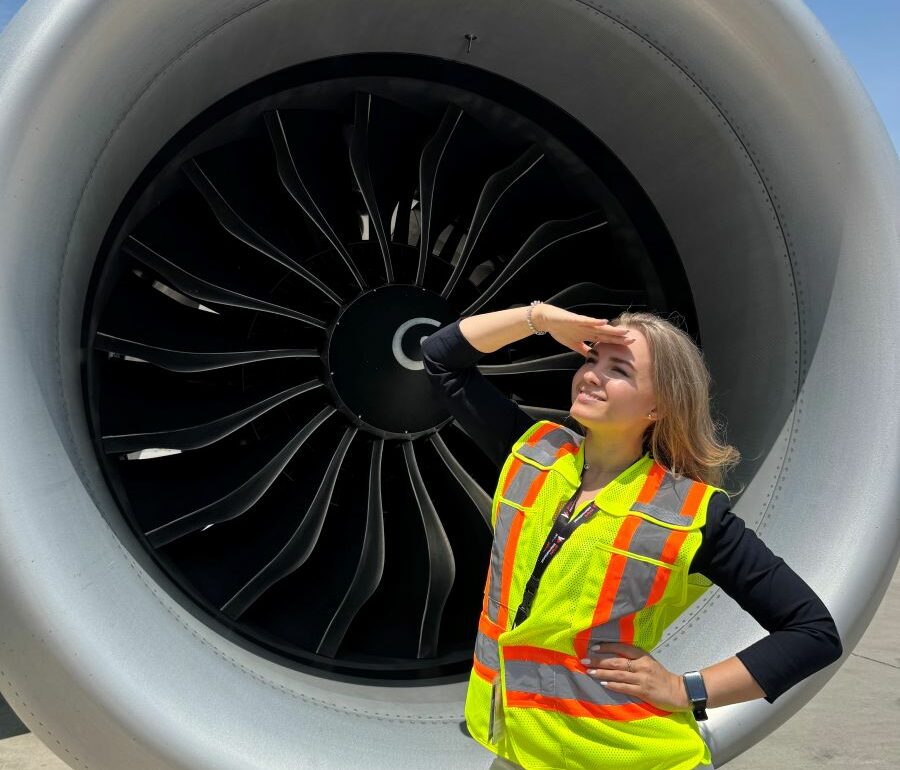When people hear about women in aviation, the first image that often comes to mind is flight attendants helping passengers feel safe and comfortable on board. But in aircraft hangars – where technical issues are solved, planes are prepared for flights, and documentation is prepared – women are still a rare sight.
Thankfully, this is slowly changing. More women are finding their place in the industry and building inspiring careers. One of them is Greta Vinogrodska, Head of Sales and Business Development in Canada for the international aircraft maintenance (MRO) company FL Technics. She now works with some of the world’s largest aircrafts and is responsible for developing sales in the global aviation market. Greta’s story proves that career opportunities in aviation are shaped not by gender, but by curiosity, hard work, and the drive to improve.
Her father’s dream sparked her journey in aviation
Greta’s passion for aviation started in childhood, even if she didn’t realise it at first.
“My father always wanted to be a pilot, but poor eyesight meant he had to give up on that dream. His love for aviation never faded, though. We often went to Vilnius Airport together just to watch planes take off and land. Back then, you could enter the terminal even without a flight ticket,” Greta remembers.
At the time, these visits felt like nothing more than a fun father-daughter ritual. But when she took her first flight at the age of twelve, everything changed.
“My first flight left a lasting impression on me. When the plane lifted off the ground, it felt like I was both flying and falling at once. In that moment, I knew – aviation was the world I wanted to be part of,” she says with a smile.
This passion turned into a clear career path. Greta studied Aviation Management, started work at Vilnius Airport, later became a flight attendant, and eventually moved into aircraft leasing and acquisition industry. Today, she lives in Toronto and works with the FL Technics aircraft maintenance team, serving clients worldwide.
“Even though I’ve travelled a long road in aviation, every time I see a plane take off, I remind myself: this is where it all began – and those moments still push me forward,” she says.
From paperwork to pouring oil into an aircraft engine
Aviation is still seen as a male-dominated field – especially in technical and managerial roles. Greta admits she had doubts at first:
“When I started in my current position, I sometimes questioned whether I’d really understand all the technical details or be able to answer clients’ engineering questions. Even my family wondered about it.”
She says the best way to learn was by spending time on the ramp with engineers.
“Most of my time is in the office, preparing documents, attending meetings and negotiations. But I always try to learn as much as I can about the technical side of aircraft. Sometimes I would even pour oil into an engine myself or join engineers in pre-flight checks. When the aircraft started up and moved forward, I felt incredibly proud of the whole team,” Greta recalls. “Moments like that bring back the feeling of aviation romance that’s been driving me since childhood.”
In aviation, competence matters most – not gender
Greta doesn’t see big differences between Lithuanian and Canadian attitudes towards women in technical fields, though she notes that in Canada there is more formal support – initiatives, conferences, and networks for women in aviation.
“But I believe it’s not about slogans like ‘we support women’. What really matters is what companies actually do. At FL Technics, I was never treated differently because I’m a woman. But whenever I showed initiative to learn, I always received strong support. That, to me, is real equality – when opportunities are given not because of gender, but because of your willingness to grow.”
She also stresses that women should never feel they need to act more masculine to fit in.
“Femininity isn’t a weakness – it’s a strength. There’s space for everyone in aviation. What matters is curiosity, eagerness, and courage to learn. When your team prepares an aircraft and it takes off, no one cares whether the job was done by a man or a woman. What matters is that the plane took off – and that you were part of making it happen,” she says.
Working in an international team: differences in culture and aircraft requirements
Greta calls FL Technics her platform for growth – step by step, it led her to Canada. She explains that working in North America feels very different from her experience in Lithuania: not only because of the clients and the culture, but also because of the aircraft.
“Now I work with people from India, France, Canada. Everyone speaks English, but each person has their own accent and style of communication. Once I spoke with a client from Newfoundland, and his accent was so strong I could barely understand half of what he said. I had to ask him to repeat several times. Situations like that show how important it is to adapt – and not be afraid to ask questions,” she says.
The technical side of aircraft maintenance also differs. In Canada, the standards of TCCA (Transport Canada Civil Aviation) apply, and they’re sometimes different from Europe’s EASA (European Union Aviation Safety Agency) rules.
“At first, it felt unusual, because TCCA standards seemed more flexible, leaving more space for decisions on the spot. But I quickly realised – it’s just a different way of reaching the same goal: a safe aircraft and safe passengers. The difference was even more obvious when I looked at the aircraft I work with daily. In Toronto, real aviation giants take off, ones we won’t even see in Lithuania: the Boeing 787 Dreamliner, the Boeing 747, the Airbus A380.”
One of the biggest contrasts she notices is the pace of work.
“In Lithuania, I was used to everything moving quickly – answers, decisions, projects. Here in Canada, people are more relaxed. They don’t rush, and they want to feel comfortable with their decisions before moving forward. Sometimes documents take longer than we’re used to in Lithuania, and at first this frustrated me. Now I see it as part of the culture – things move in their own rhythm,” Greta says.


